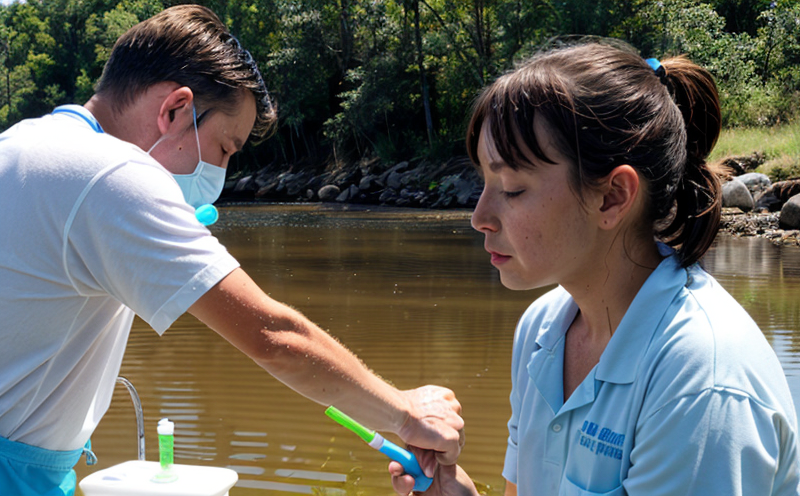EPA 160.3 Total Suspended Solids TSS Test in Water
The EPA 160.3 Method is a standard procedure used to measure total suspended solids (TSS) in water samples, which is critical for ensuring compliance with environmental regulations and maintaining safe drinking water quality.
Total suspended solids refer to the matter that can be retained on a filter after a water sample has been filtered at a specified pressure. These particles may include clay, silt, metal oxides, biological materials like bacteria or algae, and other organic and inorganic compounds. Measuring TSS helps monitor pollution levels, assess water clarity, and evaluate the effectiveness of wastewater treatment processes.
The EPA 160.3 method is widely recognized for its precision and reliability. It involves filtering a known volume of water through a pre-weighed filter membrane under controlled conditions to capture all suspended matter. After filtration, the filter is dried at a specific temperature (e.g., 103°C) until constant weight is achieved, then reweighed to determine the mass of suspended solids.
This testing method aligns with international standards such as ISO 7876 and ASTM D4492. Compliance with these standards ensures that laboratory results are accurate and comparable across different facilities and jurisdictions.
The EPA 160.3 procedure is essential for industries involved in water treatment, wastewater discharge monitoring, environmental impact assessments, and drinking water safety. It helps identify potential sources of contamination and assess the effectiveness of mitigation strategies.
Industry Applications
| Industry Sector | Application |
|---|---|
| Water Treatment Plants | Evaluate filtration efficiency and monitor water clarity post-treatment. |
| Wastewater Management | Determine the effectiveness of treatment processes and compliance with discharge limits. |
| Environmental Monitoring Agencies | Conduct environmental impact assessments and establish baseline water quality data. |
| Drinking Water Authorities | Ensure safe drinking water standards are met by monitoring TSS levels in treated water.|
| Pharmaceutical Manufacturing | Monitor the purity of process waters to prevent contamination and ensure product safety. |
- Water Treatment Plants: Regularly test TSS levels to fine-tune filtration systems and reduce operational costs.
- Wastewater Management: Implement real-time monitoring to comply with stringent discharge regulations.
- Environmental Monitoring Agencies: Establish long-term trends in water quality for better environmental management.
- Drinking Water Authorities: Ensure public health by maintaining strict TSS limits in drinking water supplies.
- Pharmaceutical Manufacturing: Prevent contamination and ensure regulatory compliance.
Why Choose This Test
The EPA 160.3 test is a cornerstone of environmental monitoring, providing accurate and reliable data on total suspended solids in water samples. Here are some key reasons why this method should be your choice:
- Standardized Procedure: The method adheres to stringent international standards, ensuring consistent results across different laboratories.
- Precision: Accurate measurement of TSS helps identify and mitigate sources of water pollution effectively.
- Compliance: Ensure regulatory compliance by meeting the strictest environmental standards.
- Data Reliability: The method offers consistent results, enhancing trust in laboratory findings.
The EPA 160.3 test is ideal for industries that need to monitor water quality closely and make data-driven decisions. It provides actionable insights into the state of water bodies, helping businesses take proactive steps towards sustainability and environmental stewardship.
Quality and Reliability Assurance
The EPA 160.3 test is renowned for its high level of accuracy and reliability, thanks to rigorous quality control measures in place at our laboratory. Here’s how we ensure the highest standards:
- Pre-Test Preparation: Samples are prepared using industry best practices to avoid contamination and ensure accurate measurements.
- Instrumentation Calibration: All equipment used for filtration and drying is meticulously calibrated to international standards.
- Dry Weight Verification: Filters are dried under controlled conditions to ensure consistent results.
- Data Analysis: Results are analyzed using sophisticated software tools, providing accurate and detailed reports.
The combination of these measures ensures that our test results are reliable and can be trusted by regulatory bodies and industry stakeholders. Our commitment to quality extends beyond the lab, encompassing all aspects of service delivery, from sample receipt to final report generation.





